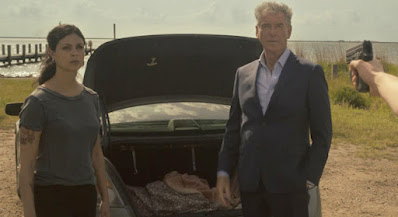Given the alarming rise of antisemitism and Holocaust denial during the past several years, this film’s arrival couldn’t be more timely. Academy voters obviously thought so, and granted it five Oscar nominations.
Director/scripter Jonathan Glazer’s extremely loose adaptation of Martin Amis’ 2014 novel is undoubtedly one of the most chilling and memorably haunting movies ever made: an unusual Holocaust story which — like long-ago radio dramas — derives its power from what it makes us imagine.
Amis based his novel’s cold-blooded villain, Paul Doll, on Auschwitz concentration camp commandant Rudolf Höss; Glazer boldly draws directly from history in his depiction of the actual Rudolf (Christian Friedel), his wife Hedwig (Sandra Hüller), their five boisterous children, and the bucolic setting in which they live.
“Bucolic,” only by force of disregard.
The year is 1943. Glazer opens his film on a charming pastoral scene, as Rudolf and his family are joined by friends for a riverbank picnic. (Actually, this isn’t how the film begins, but I’ll get back to that.)
Everybody returns home after an enjoyable day of sun, splashing in the water, and convivial conversation. Rudolf and his family live in a charming multi-story villa, their every need tended by quietly obedient young women. Hedwig delights in the Edenic garden she has nurtured behind their home, with the assistance of numerous workmen.
Glazer stages these outdoor scenes against the tall, barbed-wire-topped concrete wall that runs the length of their property: the most grisly theater backdrop ever imagined, with unspeakable horrors taking place behind this stage’s metaphorical closed curtain.
(The 40-square-kilometer area immediately surrounding the Auschwitz concentration camp was designated by the Nazi SS as interessengebiet: the “zone of interest.” Höss and his family did indeed live therein, alongside the camp.)
Glazer calmly, clinically — relentlessly — depicts the banality of the day-by-day Höss family life. Hedwig shows flowers and buzzing bees to their infant daughter. Younger son Hans (Luis Noah Witte) plays with toy soldiers and occasionally beats a toy drum; his sisters Heidetraut (Lilli Falk) and Inge-Brigitt (Nele Ahrensmeier) cavort in the small swimming pool their father built, complete with wooden slide.
We can’t call their behavior denial; that’s too easy. It’s actually indifference. While evil comes in many forms, casualevil arguably is the worst.






